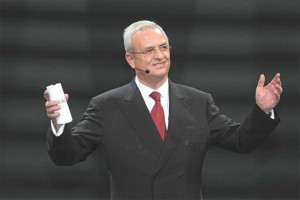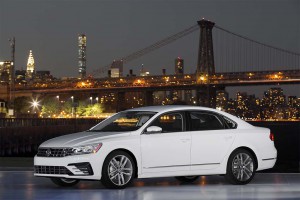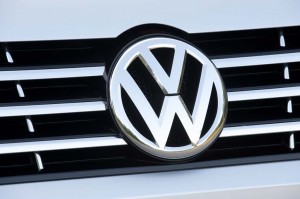Volkswagen is setting aside 6.5 billion Euros, or $7.3 billion, to cover the anticipated cost of resolving its diesel emissions cheating scandal, a figure that could nonetheless be eclipsed by potential penalties and lawsuits facing the German maker in the U.S.
The issue, meanwhile, now is spreading to other markets, VW confirming it used the same illicit software – dubbed a “defeat device” by U.S. regulators – on 11 million diesel vehicles sold worldwide. That has triggered calls for new investigations in markets from South Korea to the European Union.
The money VW has aside is part of the company’s efforts to “win back the trust of our customers,” the maker said in a statement Tuesday. Meanwhile, it noted that it is “working intensely” to find a technical solution to removing the software without reducing the performance of affected VW products.
A total of 488,000 VW and Audi brand vehicles equipped with 4-cylinder engines were recalled last Friday, while the automaker ordered dealers to stop selling products equipped with those diesels.
Concerns about the mounting costs and potential impact to VW’s reputation have led to a panic among the company’s investors. On Monday alone, the value of VW shares plunged by nearly 20%, and the sell-off was continuing midday on the German exchange.

VW CEO Martin Winterkorn came out the winner in a fight with former board chairman Ferdinand Piech but could now be in trouble.
The crisis could lead to a shake-up in management at Volkswagen AG, industry analysts have warned. The company already went through turmoil this year when CEO Martin Winterkorn fended off an attack by former mentor and VW board member Ferdinand Piech.
(Can Winterkorn survive latest crisis? Click Herefor the story.)
In a new statement, VW confirmed what had been suggested by the Environmental Protection Administration, that it had surreptitiously equipped its diesel vehicles with software designed to recognize when those products were being tested on a dynamometer, essentially an automotive treadmill. In such a situation, the full complement of onboard emissions controls systems would operate at their max, bringing the vehicles into compliance with U.S. – and even tougher California – emissions standards.
But once the testing would be completed, sources close to the EPA investigation discovered, the vehicles would revert to a different mode, effectively allowing emissions levels to increase by as much as forty times.
“A noticeable deviation between bench test results and actual road use was established solely for this type of engine,” the statement explained. “Volkswagen is working intensely to eliminate these deviations through technical measures.”

VW won't sell versions of the new 2016 Passat with the 4-cylinder diesel until the car's emissions software can be reprogrammed.
(2016 VW Passat makes awkwardly timed debut. For more, Click Here.)
While the maker acknowledged the computer control systems on 11 million vehicles contain the illicit code, it also claimed that the “majority of these engines the software does not have any effect.”
The U.S. has the world’s toughest diesel emissions standards, largely focusing on levels of micro-fine particulates and smog-causing oxides of nitrogen. In Europe, where the emphasis is on global warming gases like CO2, diesels handily meet test standards because they are so energy efficient.
Even so, there are mounting calls in Europe for a full investigation of the VW diesel test scandal, and CEO Winterkorn has told Germany’s transit ministry the company will fully cooperate with its own investigation. Minister Alexander Dobrindt has called for a full investigation. So have officials in South Korea.
Whether the $7.3 billion set-aside is enough remains to be seen. According to EPA rules, VW could be fined up to $37,500 for each vehicle not in compliance with emissions regulations, or a total of around $18 billion. California regulators could issue their own fines. Meanwhile, the U.S. Justice Department has reportedly taken the preliminary steps to open a criminal investigation.
Several law firms have taken initial steps of their own to bring class action lawsuits against Volkswagen on behalf of owners.
(U.S. Justice Dept. opening investigation into VW diesel cheating scandal. Click Here for the latest.)
But perhaps the biggest question concerns the impact the scandal will have on VW’s image and sales. The maker overtook Toyota to become the world’s best-selling automaker during the first half of 2015. But it has been struggling to rebuild momentum in the critical American market where about a quarter of its sales are diesel-powered vehicles. For now, VW has halted the sale of those models until it can come up with a fix for the faulty software.


This seems very strange to me that there would be a comprehensive effort to disable emissions controls because anyone with a clue would understand this would eventually be discovered. It will be interesting to see exactly what transpired, when the dust settles.